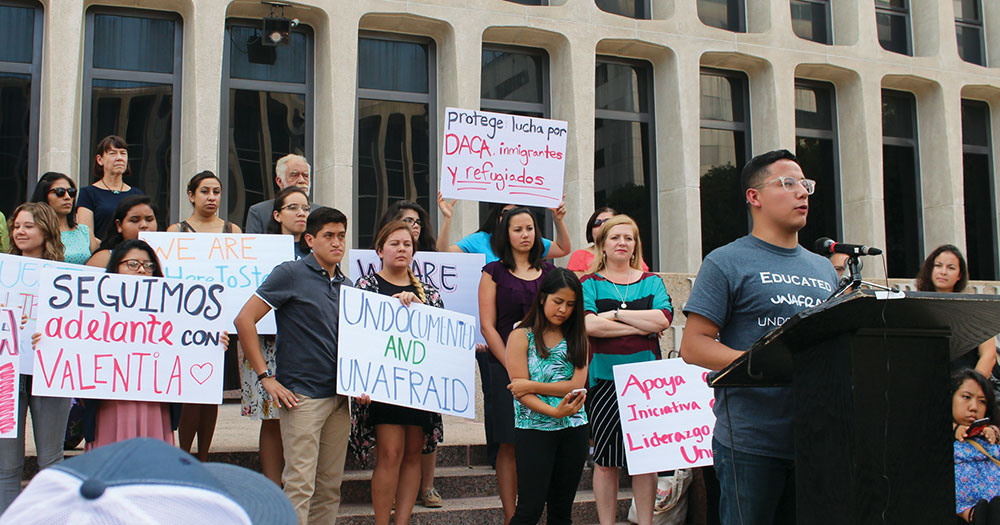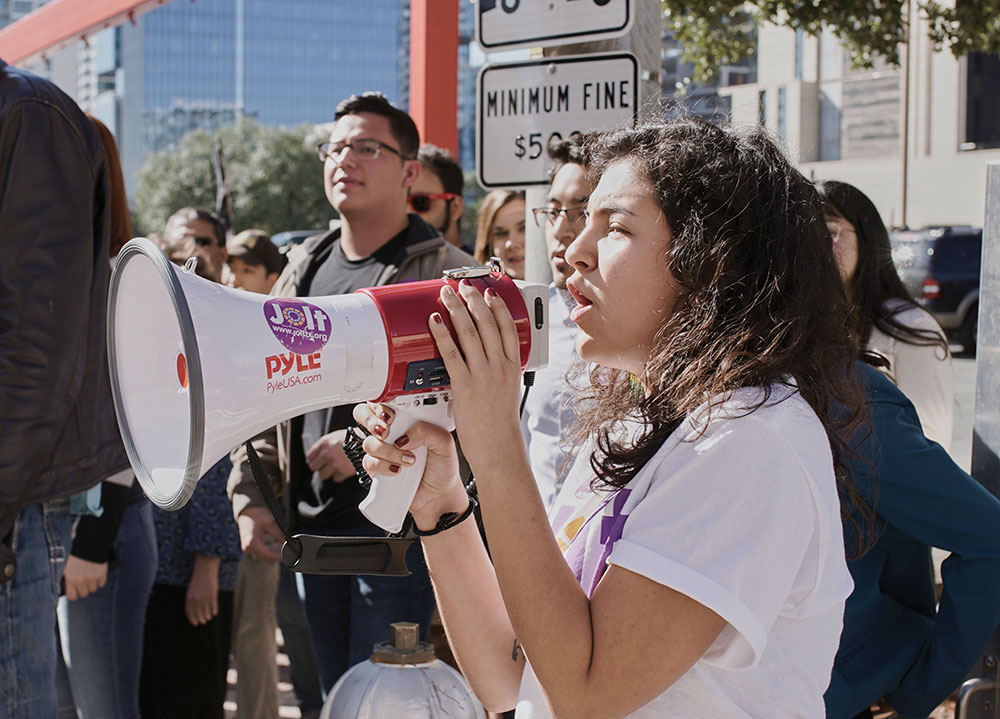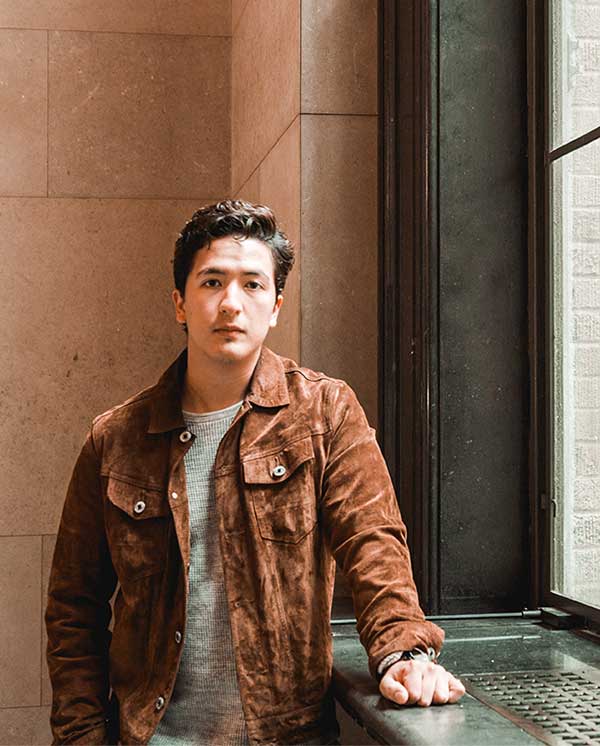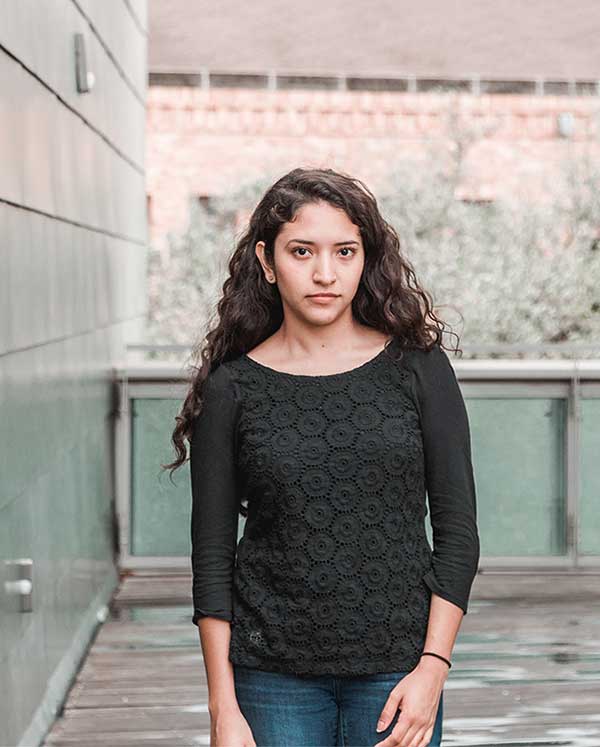For the past six months, Cervantes has been feeling the pressures that immigrants often deal with—to make no mistakes, to work twice as hard as anyone else, to prove their worth—more than usual. He is a Dreamer, the name used to describe undocumented immigrants whose parents moved them to the U.S. as children. Brought to the U.S. from Mexico at the age of 5, he’s also a recipient of the Deferred Action Childhood Arrival (DACA) program, an executive memorandum issued by the Obama administration that allows eligible Dreamers the ability to defer deportation for two years at a time and acquire a work permit.
But on Sept. 5, 2017, President Donald Trump rattled the lives of DACA recipients across the U.S. when he declared his decision to end the program, pushing lawmakers to come up with a permanent solution to the immigration issue. Critics have long argued that Obama’s policy—which was only ever intended to act as a band-aid while Congress deliberated over immigration legislation—was unconstitutional and overreached his executive powers. Conversations between legislators leading up to Obama’s decision to create DACA kept ending in a stalemate, and the same has happened again in Congress today. While DACA is consistently shown to be popularly favored by Americans (according to a recent CNN poll, 84 percent of Americans were in support of keeping Dreamers in the states), the status of these young immigrants is still being used as a bargaining chip in politics.
Though the announcement was everything many DACA recipients had feared, it came as no surprise. Latin American studies junior Daniela Rojas, a DACA recipient who was brought to the U.S. from Colombia by her parents when she was 11, called her father in tears. “I can’t believe this is actually happening,” she told him. A resident of Elgin, Texas, since she was 6, government sophomore Vanessa Rodriguez got word during class and slipped out the back door to sit alone, take a breath, and tell herself everything would be alright. Cervantes remembers crying the day he heard the news. “Ending DACA put the brakes on our lives,” he says.
Since then, students and other young immigrants who have called Texas their home for most of their lives have been waiting for lawmakers to reach an agreement on what will happen to them. Trump gave Republicans and Democrats six months to deliberate on a bipartisan deal to keep these undocumented youths in the states (according to the Washington Post’s polling forum Monkey Cage, there is a 67 percent probability of a deal actually being struck by April 1). As of press time, following the second of two government shutdowns, Trump signed a spending deal into law without Congress coming to a conclusion on DACA. With just a few weeks left before DACA’s end, the Senate will commence open debate on an immigration proposal. Trump said in his State of the Union speech that DACA recipients and anyone else who is eligible for the program may acquire citizenship based on “education, work requirements, and good moral character.” In exchange for this, legislation would have to meet three conditions: $25 billion for a wall and border security, an end to the diversity visa lottery program, and restrictions on what the Trump administration calls “chain migration,” a term used to describe the visa program through which immigrants already residing in the U.S. can bring their family members over.

A proposal including these conditions is not favored by Democrats, Dreamers, and DACA advocates, who also view the phrase “chain migration” as a negative one. They prefer “family reunification.” In 2001, the Democrats pushed for a “clean Dream Act,” which would create a process for qualifying immigrant minors in the U.S. to attain conditional, and eventually permanent, citizenship. It calls for a bill without stipulations like increased funding for border security, interior enforcement, and detention centers attached.
With 124,000 DACA recipients in Texas, the state is home to the nation’s second-highest population of Dreamers (a term originally coined by young undocumented immigrants themselves and brought to Congress in 2001 when Democratic Sen. Dick Durbin of Illinois used the term at the first official hearing for the Dream Act). Republicans and Democrats are in a race against time to approve a bipartisan immigration policy. For many of these DACA recipients, come March 5, their time in the U.S. is up. (Editor’s Note: March 5 was the original deadline President Trump gave to Congress to reach legislation on DACA. But multiple federal judges have ordered the Department of Homeland Security to resume renewing all existing DACA permits. March 23 marks the next government funding deadline.)
The idea of citizenship doesn’t mean much when you’re a child, and young immigrants brought to the U.S. illegally don’t always know they’re undocumented. “It’s hard to grasp, like ‘Why can’t I be here? Why do borders exist?’” says Rojas, who didn’t fully understand her status until high school. When she, her parents, and her little sister moved to the U.S. in 2006, Rojas had no idea it would be permanent. Her father had lost his job in Bogota, Colombia, and violence in the area—part of the more than 50-year-long conflict between the government and far-left guerrilla forces—made life in the region terrifying. So her parents fled to the U.S. knowing they would never return.
Rodriguez, who currently works part time at Austin City Hall as a constituent liaison, says though she hasn’t always known she was undocumented, from an early age she knew her life was different from others around her. She comes from a mixed-status family, in which she, her mother, father, and two older sisters are undocumented but her 13-year-old brother was born in the U.S. Her family moved to Texas in 2004 from a small city in the Mexican state of Tlaxcala. She doesn’t remember much about her life in Mexico, save for what old photos show her. She remembers her grandmother, her cousins, the small house they lived in that didn’t always have running water, and that they grew their own food. Her parents moved to the U.S. in search of something better.
“Mija, do you want to come to work with me?” her dad asked her one day when she was in the first grade. Excited to see where he worked, she tagged along as he took her to a large, beautiful home. She thought it was his office until he walked her around to the backyard and showed her a pipeline. “This is what I do for a living,” he said. “You see this line? I’m going to make a big hole and put gas pipes in so the people in this house can have a pool.” That’s when she started to see her world more clearly.
It weighed on Rodriguez that her father spent his days working outside, taking note of how his skin grew darker each day while her mother cleaned other people’s homes. “You’re going to have to work really hard in this country,” her father told her. “You’re going to have do everything you can to the best of your abilities and work twice as hard, study twice as hard so that you don’t have to be like me.”
Then, eight years after Rodriguez moved to the U.S., the Obama Administration implemented the DACA program. To be eligible for the program, applicants must meet a number of conditions: They must have come to the U.S. before their 16th birthday; lived in the U.S. since June 15, 2007; been under age 31 as of June 15, 2012; have completed high school, received a GED, have been honorably discharged from the armed forces, or are enrolled in school; must pay an application fee of $495 every two years when they submit their forms to renew their DACA permit; and must not have been convicted of a felony or serious misdemeanor.
Suddenly, Dreamers could emerge from the shadows. They could get a social security card, a driver’s license, and a job. Rodriguez, who went on to become salutatorian at her high school, waited to apply for her DACA permit until 2015 because her parents could not afford the steep application fees for her and her two sisters simultaneously. She says she felt proud upon receiving her new status. She started her first job during her senior year of high school, allowing her to pay her own living expenses during her freshman year at UT. Cervantes says his DACA status gave him the confidence to walk with his head held high, something he hadn’t felt before. Rojas, who applied for her DACA in 2012, says the first thing she did was get her driver’s license.
“It just felt like finally I could lead this normal life,” she says. Rojas hated living in the U.S. at first. She didn’t speak a word of English and everything was a culture shock. But time passed, and slowly but surely the U.S. began to feel like home. Although she applied for her DACA almost immediately after the program came out, her family—like most—had their reservations about giving up all of her information to the government. They still sometimes question the decision, worrying that someday their information might be used against them. And having DACA still doesn’t mean Rojas has the same benefits as other students. DACA recipients do not qualify for federal financial aid like FAFSA; studying abroad, though possible, can be much more difficult to coordinate; and they cannot vote. Still, she is grateful for the opportunities DACA has given her. She is a part of UTeach, an innovative STEM (science, technology, engineering and math) teacher certification program on campus, and works part-time organizing students as a chapter coordinator for Jolt, a Texas nonprofit that advocates for Latino issues.
Without DACA, Rojas says, she would not be where she is today.
Just a few days before Christmas break, on Dec. 20, a group of UT students, DACA recipients including Rojas, Cervantes, and Rodriguez, and other allies marched through Downtown Austin, shouting “What do we want? Freedom! When do we want it? Now!” The protest, hosted by Jolt, was meant to urge Congress to come to a deal. They stood in front of the Capitol, each Dreamer sharing their story with the public. “I am a human being, I have dreams, and I deserve equality,” Rodriguez stood up and said.
The group walked to Sen. John Cornyn’s office and demanded he pass a “clean Dream Act.” With them they carried a large art installation composed of graduation caps that formed the shape of Texas.
Rojas has helped coordinate a number of protests for Jolt in the last year, and Cervantes and Rodriguez are both members of University Leadership Initiative, a campus organization made up of undocumented UT students who advocate for the immigrant community. The three of them are some of the most outspoken undocumented students on campus, dedicating most of their free time to standing up for others just like them who have not found their voice. They can be found in a number of articles and news segments around Austin in media outlets such as the Texas Tribune and Austin American-Statesman, or stations like Spectrum News, sharing their stories. They feel it is their duty to do so. “I can’t be silent,” says Cervantes, who felt ashamed of his undocumented status for most of his life until finding communities that empowered him at UT. “I want to be a leader—to be a part of history.”


When DACA ended, Rodriguez says she began feeling guilty, knowing she had more time than others whose permits end on March 5. A few hours after Trump’s announcement in September, Rodriguez, Cervantes, and other members of ULI held a press conference in opposition to the DACA rollback at the J.J. Pickle Federal building in downtown Austin. “I’m here to say I strongly oppose the president’s decision to end DACA,” said Student Body President Alejandrina Guzman. “We must use [our] privilege and not be silent. This issue transcends communities.”
Though they don’t always feel directly supported by the university, Rodriguez, Rojas, and Cervantes have found reinforcement all around them. Last summer, they advocated against Senate Bill 4, a Texas law often referred to as the “santuary cities” ban, that gives local law enforcement the authority to ask about a person’s immigration status during routine interactions. Austin Mayor Steve Adler opposed the bill, and in November the City of Austin joined the SAFE (Safety and Fairness for Everyone) Cities Network, which will provide free legal representation to anyone facing deportation. It is a program started by the national nonprofit Vera Institute of Justice that works to find cities willing to pledge support for their immigrant populations facing increasing threats of deportation.
Following Trump’s announcement, UT president Gregory L. Fenves issued a statement to the UT community voicing his opposition to the end of DACA. In November of 2016, he had joined hundreds of other university presidents in signing a letter to then-President-elect Trump asking that DACA be maintained. “Some of those young immigrants are UT students and they are vital members of our campus community,” he wrote in his statement. “Each one of them is valued. Each one of them contributes to the UT experience.”
Texas’ Commissioner of Higher Education Raymund Paredes, BA ’64, PhD ’73, Life Member, says he thinks about DACA every day. With 25,000 undocumented students attending public colleges across Texas, he works to ensure lawmakers and educators keep undocumented students in the states. “The claim that so many people come to the U.S. on welfare or commit crimes simply isn’t true,” he says. “The vast majority of undocumented residents or DACA students are exemplary young people, holding down an education or getting jobs and surviving. They’re the kinds of young people that most adults would want in their neighborhoods and would be proud to hire. They are the future of this country.”
As of this moment, Cervantes, Rojas, and Rodriguez cannot tell you what their lives will look like beyond 2019. If Congress fails to act, all of their permits expire that year and the lives they’ve built will be put up for grabs. And returning to their birth countries would make them strangers in a strange land. Rodriguez will not have graduated by the time her DACA permit ends and she is unsure if she will be able to finish school. Though there is still a chance for students like her to earn a degree under Texas House Bill 1403, state legislation passed in 2001 that allows undocumented students to qualify as Texas residents and pay in-state tuition at public colleges and universities in the state.
In their perfect world, one where Dreamers are allowed to stay, each student knows what they would like to be doing after graduation.
Cervantes wants to earn a master’s in public affairs at the LBJ School, and if UT Law will have him, a law degree. He wants to do legal advocacy work around issues that affect Latinos. In her immediate future, Rojas hopes to teach high school history. Long-term, she also wants to go to law school and become an immigration lawyer. Like Rojas, Rodriguez wants to work in education, teaching high school history or government. She says she wants to help students who come from disadvantaged situations achieve what she has. She wants them to understand their value.
“Growing up undocumented, I believed I wasn’t going to achieve much,” she says. “I never saw college as a viable option until my senior year thanks to one of my teachers. It was empowering to have an educator telling me, ‘You can do it. I believe in you and this land is yours.’ I want to be able to give that back to future generations of Americans.”
Although the next few months are still rife with uncertainty, Cervantes, Rojas, and Rodriguez remain hopeful. Acquiring citizenship is not an option for any of them, or their families. Their parents have overstayed their visas so being eligible for citizenship would require them to go back to their old countries for at least 10 years before returning. And because each student technically entered the country “unlawfully,” obtaining citizenship is extremely unlikely.
Each of them has no plans on backing down from standing up for what they believe wholeheartedly is their right: a pathway to citizenship. “We belong here,” Rodriguez says. “Nothing was ever given to us for free. We’ve worked extremely hard to get to this university we love. And someday, we hope we’re able to live our lives to the fullest.”
This story originally appeared in the March/April 2018 issue of the Alcalde.




